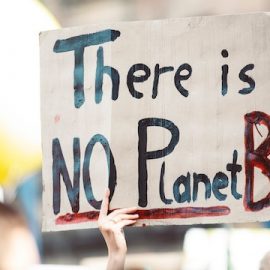
This is a free excerpt from one of Shortform’s Articles. We give you all the important information you need to know about current events and more.
Don't miss out on the whole story. Sign up for a free trial here .
How will global warming affect coffee and wine production? How does hot weather affect your libido and mental health?
Aside from causing extreme weather events and the loss of polar bear habitats, there are other side effects of global warming that directly impact your day-to-day life. Hotter tempers, lower productivity, and even mornings without coffee may be in our future.
Here, we discuss the impact that rising temperatures have on mental and physical health, leisure activities, and our daily routines.
Extreme Heat Is Increasing
The US government defines extreme heat as “a period of high heat and humidity with temperatures above 90 degrees for at least two to three days.” Environmental researchers say a growing number of people around the world are living with extreme heat, and it’s not going away. Global temperatures have been rising since the 19th century, in large part due to humans burning fossil fuels and releasing gasses that trap heat in the atmosphere.
In addition to fossil fuel warming, a cyclical phenomenon known as the El Niño-Southern Oscillation contributes to global temperature increases by shifting heat in and out of deep ocean layers. Meteorologists expect El Niño conditions to return this summer and fuel record-high temperatures.
Here’s a look at some of the side effects of global warming that aren’t often discussed.
Climate Can Affect Your Daily Life in Unexpected Ways
We know that climate change causes polar bears to swim longer distances to find sea ice, and while this thought is heartbreaking, it can seem far removed from our daily lives. By understanding how climate change affects us—and not just cuddly animals in the Arctic—we’ll get a better sense of how pressing the issue is.
How Climate Change Could Affect You
The earth is now about 34° Fahrenheit warmer than it was in the 1800s, and it’s projected that it’ll warm up by nearly 40° Fahrenheit by the end of the century. Some analysts predict that we’re likely to surpass the hottest year on record (2016) within the next five years. Even incremental increases in temperature lead to more wildfires, droughts, heat waves, and storms, which lead to the loss of lives, property, and livelihoods. But even if you don’t live in an area that’s directly affected by such disasters, you could still feel the effects of climate change.
Hotter Tempers
Climate change might cause you to have more arguments with people around you. That’s because rising temperatures trigger adrenaline production and a “fight or flight” response, which puts you on edge. The heat may also lead to a surge in serotonin, which makes you more impulsive. Additionally, your body may expend so much of its energy to manage the heat that you’re unable to focus on keeping your emotions in check.
Lower Libido
When your body works hard to cool you down on hot days, this not only reduces your ability to regulate your emotions but also lowers your sex drive. In particular, men may produce less testosterone as they divert their energy from reproduction to temperature regulation, negatively affecting arousal, erection, and ejaculation.
Poorer Mental Health
According to the World Health Organization, rising temperatures are a threat to mental health as the heat makes you more anxious or depressed. Those with existing mental conditions are especially at risk—the American Psychiatric Association states that people with chemical imbalances have a harder time coping with the heat. Further, studies suggest a link between warmer temperatures and an increase in suicide rates.
Reduced Productivity
The next time you don’t get as much done as you’d like, you can blame climate change. The International Labor Organization estimates that at 91-93° Fahrenheit, you’re only working at 50% capacity. While it’s tough for office workers who have to perform complex tasks like math, it can be brutal for those working outdoors and exposed to direct sunlight (such as construction workers and farmers) and inside manufacturing plants (which can be sweltering due to heat-emitting machinery and a lack of air-conditioning).
Fewer Vacation Spots
If you think a vacation can help you manage the mental and physical toll that climate change is taking on you, think again. Aside from severe heat making travel less viable in the summer, there may be fewer getaway options as extreme weather conditions threaten popular destinations.
Rising sea levels caused by expanding seawater and melting glaciers means seaside holiday spots like Waikiki Beach in Hawaii, South Beach in Miami, and Copacabana Beach in Rio de Janeiro are losing a lot of shoreline where you can stretch out and relax; it’s estimated that San Francisco’s famed Ocean Beach has lost as much as 180 feet of sand. The Maldives, the lowest-lying country in the world, is at risk of disappearing completely.
Worse Wine
Wildfires affect more than just ecosystems and hiking tracks—they’re also making it harder for winemakers to produce consistently good wine. Smoke from wildfires can taint grapes and give wines an unpleasant, ashtray-like flavor. Additionally, grapes are notoriously sensitive to environmental factors like soil, rain, and fog; heat especially can supercharge ripening and throw off the fruit’s delicate balance of sugar, acid, and other compounds. As a result, grapes end up with a uniform raisin-like sweetness, stripping wines of their distinctive flavors.
Coffee Shortage
Just as climate change affects grapes, it also affects coffee plants. It’s estimated that by 2050, four of the top five coffee producers—Brazil, Vietnam, Colombia, and Indonesia—will lose half of their viable coffee-growing land as a result of increased temperatures. Some posit that, with the impending shortage, coffee will become an expensive, occasional treat rather than a daily beverage.
The potential loss of your morning caffeine fix? That alone could be enough to keep you up at night.
How Can You Prepare for It?
How climate change will affect you depends in large part on where you live. Odds are that you’ll fall into one of two categories: You’ll either be forced to move, or you live in an area those people will flock to. Either way, planning and preparation may help you and your loved ones through the worst effects of climate change.
If You’re Likely to Become a Climate Refugee
If you’re in an area that may be severely harmed by climate change, make an evacuation plan. Figure out where you and your loved ones will go: perhaps someplace where you have family or friends to support you, or else a city that’s likely to avoid the worst effects of climate change. If it’s practical, look into leaving before it becomes an emergency.
It’s also important to know what you’ll take with you if you have to evacuate. You’ll need food, medical supplies, toiletries, and important documents like your passport or birth certificate. Have a “bug-out bag” ready to go in case you need to leave quickly, such as if a wildfire is approaching.
If You’re Living in a Potential Climate Refuge
If you live someplace that climate refugees are likely to flee to, brace for some dramatic changes. Your city is likely to become a lot more crowded, meaning that housing and basic necessities like food could become more expensive, and jobs may be scarce. If possible, start preparing for that financial hardship now: Build up your savings and look for stable, long-term investments to support yourself through hard times. Finally, no matter which group you end up in, it’s important to think about what opportunities this population shift might hold. Some scientists have predicted that, while the southern and western US collapse, the Pacific Northwest and New England will see corresponding economic growth as people move to those areas. So, don’t just think about how you’ll escape—think about where you’ll end up and what you could do to make a living in a rapidly growing area. For example, you might invest in housing or start a small business to cater to the influx of newcomers.

Want to fast-track your learning? With Shortform, you’ll gain insights you won't find anywhere else .
Here's what you’ll get when you sign up for Shortform :
- Complicated ideas explained in simple and concise ways
- Smart analysis that connects what you’re reading to other key concepts
- Writing with zero fluff because we know how important your time is






